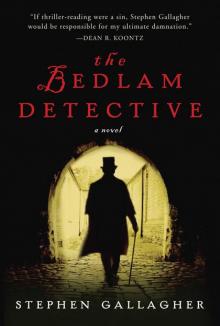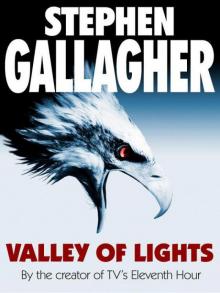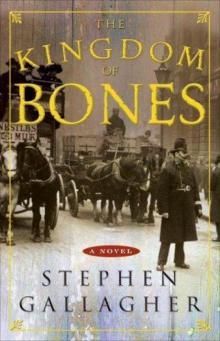- Home
- Stephen Gallagher
The Bedlam Detective Page 20
The Bedlam Detective Read online
Page 20
They emerged on the north side of the river. After their experience underground, the fog seemed almost benign. North Greenwich Station was only yards away on Johnson Street, and a train was waiting at its single wooden platform. They climbed into a carriage and all but fell into their seats.
Evangeline threw her head back and gave a great sigh of relief.
“I’ve embarrassed us both,” she said, although she seemed anything but unhappy.
“No,” Sebastian said. “You have not.”
“I know I frighten too easily. I do my best not to.”
“There’s no need to explain.”
The train had yet to move when the ticket collector came around. Sebastian showed his travel warrant, and the guard tried to argue. “This is only for one,” he said, and Sebastian said, “Are you challenging me?” and the man backed down. Evangeline’s spirits were so high that she had to fumble out a handkerchief and pretend to blow her nose, lest she be seen laughing.
“You told him,” she said when the man had gone.
“He’s just doing his job,” Sebastian said.
“Then it must be his job to annoy people.”
“For a woman who’s had a scare, you seem in good spirits,” Sebastian suggested.
“I suppose I am,” she said. “I have survived one of my nightmares.”
There was a slamming of doors, and then a whistle, and then smoke and steam as their train jerked and began to roll. It left the station at a little above walking speed, and kept to it. A plate-layer sat with hut and brazier by every major set of signals, ready to place a detonator on the rail if a warning should be needed.
Sebastian said, “You were never in danger.”
“I know,” Evangeline said. “I even knew it then. I believe that’s why it’s called an irrational fear. Are you going home now?”
“If there’s no message for me.”
Evangeline nodded and looked out the window as the vague shapes of fogbound ships in the West India Docks went by.
“I could die for a pie,” she said.
Sebastian took a moment to follow her train of thought. Messages, pie stand …
“No need to die,” he said. “Fourpence usually does it.”
“My treat. You saw to the train.”
But the pie stand had closed early and was all shuttered up. The fog was not so dense in town, though it had slowed everything to a walking pace. To Sebastian Evangeline still seemed bright, almost as if excited by life itself; she’d braved fog, she’d endured a trial underground, and now she’d even crossed the river and braved Southwark.
On an impulse, he said, “Would you like to meet my family?”
“Now?”
“We’re very close. It’s only a few minutes’ walk to where I live.”
“If you think it won’t be an intrusion.”
“Elisabeth will be glad to see a new face. I think she’s grown tired of mine.”
Guests were rare in their home. Not through shame, but because their friends were so few. As they walked through the streets of the borough, and he pointed out some of the more familiar sights that he thought might interest a stranger, he had a sense of-pride?
No. Surely not. This was Southwark, after all.
The street door to their apartments was standing open. This was unusual, but not too remarkable. But when they ascended to the rented rooms, they found Robert alone, sitting at an empty table waiting to be fed.
“Robert?” Sebastian said. “Why was the door not closed?”
Robert looked past him, to Evangeline, noting her presence without seeming to acknowledge it.
“I don’t know,” he said. “Frances must have left it that way.”
“Where is she?”
“I’m waiting for her to come back,” Robert said. “I haven’t had any dinner yet.”
“Excuse me for one moment,” Sebastian said to Evangeline, and went to look in Elisabeth’s bedroom. She was not there. He went back to find Evangeline trying to engage Robert in conversation, and Robert increasingly unhappy at this general air of growing disruption.
Sebastian said, “Robert, tell me what happened.”
“The nurse came to change Mother’s dressing,” Robert said. “Frances was up there with her. I heard them saying something and then Frances went out to get a cab. She ran all the way down the stairs. But it was ages before she could find one in the fog.”
“Did she say where they went?”
“Nobody said anything to me.”
“Was there anything else?”
Robert thought for a while.
Then he said, “Frances was crying.”
They all went to Guy’s together. They found Frances alone in the casualty waiting hall. She was alone on one of the hard benches, wiping her eyes.
Her news was not good.
THIRTY-EIGHT
While London suffered under fog, it was a crisp October day in the West Country. Driving a pony and trap borrowed from his father’s neighbor, and grateful that the pony was more experienced than he, Detective Stephen Reed made the long and lonely trek from Arnmouth to Arnside Hall at the heart of the Lancaster estate. Along the way he saw not one estate worker, nor any other living soul apart from a herd of deer that scattered away from the road as he passed by. He saw a male with broken antlers, another dragging a lame foot. Stephen Reed was no gamekeeper, but he knew neglect when he saw it.
At the Hall, he was met with silence. He tethered the pony by a water trough in the fancy courtyard and went to bang on the great iron knocker that adorned the entrance doors. It made a noise like gunfire in the yard; he imagined that it must sound like cannon fire within.
After half a minute, he banged again. Then he tried the handle out of curiosity, but the doors were locked. A minute or so after that, he heard the rattle of a key.
One door was opened and there stood Dr. Hubert Sibley, wincing at the daylight.
Stephen Reed said, “Housemaid’s day off?”
“We expect a call before a visit,” Dr. Sibley said.
“I’ll be sure to spread the word,” Stephen Reed said, and without waiting for an invitation he shouldered his way past the doctor and into the hallway.
It was gloomy within. Sir Owain was on the short balcony at the top of the Hall’s paneled staircase, looking down onto the entranceway. He seemed to hover there, like a nervous family pet; wary of visitors, but drawn by the novelty of a visit.
He called down, “Detective Reed. They told me you’d returned to other duties.”
Stephen Reed drew a folded copy of yesterday’s newspaper from inside his coat as the landowner descended the stairway. He said, “They’ve set a date to hang the tinker. Here. You can read about it.” He tossed the newspaper onto the nearest table.
As he arrived at the foot of the stairs, Sir Owain said, “What can I say? I offered myself as a defense witness. I was waiting for the call.”
“I know. But the man confessed and pleaded guilty. By now even he’s convinced that he did it.”
Sir Owain closed his fists and took a very deep breath, mastering a painful sense of upset.
He said, “No man was responsible. What would it take to make you believe me?”
“We know those children were not ‘torn by beasts,’ Sir Owain,” Stephen Reed said, with his patience growing thin. “They were disfigured with a billhook. Our police surgeon found the point of it in one of the bodies. It had broken off with the ferocity of the attack.”
“And this tinker-did he have such a billhook? If he did, were you able to fit the point to it? I suspect not. Beasts, I tell you.”
Stephen Reed considered whether to pursue the argument, and decided against it. The fact was, no, no billhook matching the point had been found, either among the tinker’s few possessions or anywhere else. But that was not the true issue, here. Arguing with a delusion simply gave it more substance in the eyes of the deluded.
Instead he said, “I take it the Lord Chancellor’s Visi
tor judged you sane enough to remain at large?”
It was Dr. Sibley who responded. He said, “We’ve had no formal decision yet, but I’m optimistic.”
With a glance at the doctor, Stephen Reed said, “So that’ll be your job safe, then.”
“Please,” Sir Owain said, moving between them and placing his hand on Stephen Reed’s arm. “There’s no need for this. Will you come with me?”
“Where?”
“There’s something I want you to see.”
Sir Owain led the way out into the grounds. Dr. Sibley followed behind. He locked the main door after them and brought along the keys. A hundred yards from the main building, reached by a graveled path, stood the estate’s private chapel. Built in stone, it was a perfect miniature of a church, complete with a porch and a bell tower. To one side of it was a small graveyard for dogs and favored servants.
The chapel was in good order. It was better than preserved; it had been fortified. There were bars on the stained-glass windows and a heavy new door with a lock that Dr. Sibley had to struggle to open.
“Please,” Sir Owain said, “come,” and he led the way inside.
The stone chapel was stone cold. The stained glass bathed its interior in the colors of blood, wine, and sap. Somewhere in a crypt under its floor lay generations of the family whose fading heritage had been bought out by the upstart industrialist. The upstart’s fortunes had faded in their turn, and rather more quickly; but in the chapel was further proof that not everything on the estate bore the marks of ruin.
There were no pews. In their place in the middle of the floor stood a mighty cast-iron vault of a tomb, black and polished. It resembled something that Houdini might lock himself up in, more strongbox than sepulchre.
“I designed this for my own remains,” Sir Owain said. “I built it to be proof against beasts. Would a man go to this trouble over a mere figment of his own imagination?”
Stephen Reed walked around it. “I’ve seen bank safes less substantial,” he said. The tomb was wider than the chapel’s doorway, and stood on feet like lions’ claws. Each dark panel bore moldings of urns and draped material. Sir Owain must have had the plates cast and brought in separately, and then assembled on-site.
Sir Owain said, “I have a genuine fear of desecration. I ask you again, Detective. Would I go to such lengths as these for no reason at all?”
“I really don’t know. All this can prove is the strength of your beliefs, not the truth of what you believe in. But that’s a lot of iron to protect mere human remains. If a man’s life is over, why fear for the flesh?”
“I can’t preserve my life. But I have seen what can happen to the flesh, as you call it. I would like to preserve my dignity when my life is done.”
“Anyone would think you planned on going soon.”
“After all that I’ve lost,” Sir Owain said, “I am counting my steps toward the day.” He placed his hand on the metal, as if he might draw some measure of strength from the contact. He said, “I think you’ll find that Doctor Sibley probably cares for my living welfare more than I care for my own.”
“Well,” Stephen Reed said, “the tinker’s lease on life is set to end in three weeks’ time. He doesn’t understand much, but he understands that.”
“What more can I do?” Sir Owain pleaded, in what seemed like genuine distress. “I offered my services to the law, but the law insists on taking its course.”
“Sir Owain,” Stephen Reed said, looking him in the eyes in a move that was often known to compel his man to sincerity. “These beasts. What are they really? Are they really out there? Or are they within?” He leaned closer. “Is this a tomb to keep monsters out, or a strongbox to contain one?”
Dryly, from over by the door, Dr. Sibley said, “I see we’ve moved on. After all the innuendo, that was almost an honest accusation.”
Sir Owain raised a hand to silence his doctor. “Please,” he said, and then he returned his attention to Stephen Reed. With one brief twitch of a rueful smile he went on, “At this point I have certain lines to speak if I wish to keep my freedom.”
“I know you’ve been rehearsed in them,” Stephen Reed said, “So let us take them as read.”
“Every man is a work in progress,” Dr. Sibley said quietly from by the door. “We should not look down on those who are damaged, just because they have further to go.”
“And may God help the tinker,” Sir Owain said, still looking at his hand, “since I cannot.”
Stephen Reed said, “The girls had a camera. For taking moving pictures. They caught something strange on their film.”
For a man so weary of life, Sir Owain was suddenly very interested.
“Where is it?” he said.
“I gave it to the prosecutors. But it was never used in evidence.”
“Why not?”
“Its images are unclear.”
Sir Owain looked across the chapel to Dr. Sibley. His agitation was obvious. The doctor gave no actual sign but returned a steady gaze as if to say, You know exactly what I expect of you at this point.
Sir Owain suddenly said, “I think I should like to pray.”
Stephen Reed could see that this took even Dr. Sibley by surprise. But what could the man do? Even the most controlling superintendent could not deny a man his prayer.
“Of course,” he said, and made a gesture of invitation for Stephen Reed to join him outside.
They stood outside, in the October air. A squirrel came bounding through the overgrown graves, froze when it saw them, and went bounding right back again.
Stephen Reed said, “Does he pray often?”
Dr. Sibley seemed bemused. “Never,” he said.
“How well do you really know him?”
“He’s unknowable. I’ve had only the most distant glimpse of what he’s been through. Whatever you may think of him, respect him. A lesser man would have gone under.”
“I’m sure he’s a tower of strength. But would you have me believe that he never knows a moment of weakness?”
“At the beginning there were many. You know I was his doctor on the rescue ship? That was where we met. He raved. He grieved. He saw the dead, and many an apparition that was never there. By being with him from those very first hours, I secured his lasting trust.”
“You were a ship’s doctor?” Stephen Reed said. “I didn’t know that. It explains your four years’ absence from the medical register.”
“I know what you think of me,” Dr. Sibley went on. “You see me as some kind of leech that clings to him, exploiting his fragile state to my own advantage. Whereas the truth is that he dare not let me go.”
“So are you watching over him for every minute of every day?”
Dr. Sibley gestured toward the chapel, where his employer prayed alone.
“Clearly not,” he said.
“But you do seem to take your dedication to an extreme. Of the four science papers Sir Owain has published in the last ten years, your name is on all of them as co-author.”
“You’ve been doing your spadework.”
“I have. Etymology, metallurgy … quite a wide range for a medical man with a seafaring background.”
“I had no hand in the papers. I’ve never claimed otherwise. The attribution was entirely at Sir Owain’s insistence.”
“So what do you make of his monsters?”
“All such monsters are monsters of the mind. The only person they threaten is the one who conceives them.”
“Neatly said. So how do you keep them under control?”
“That’s between me and my patient. I don’t dominate Sir Owain. I don’t control him for my own advantage. I help to keep his state of mind as close to normality as it’s possible to get. That doesn’t make me his master. If anything, I’m more his prisoner. I mean, I had a life before. Look around you. This is his house, his estate, his affairs. Where is my life now?”
Changing tack, Stephen Reed said, “Grace Eccles thinks you’re trying to push her of
f her land.”
“Right in one respect, wrong in another. It’s not her land.”
“From what I hear, her lease has been tested in court and it held up. That should be the end of the matter.”
“Look,” the doctor said with some exasperation. “I know Sir Owain has always let her be. But now the Lunacy commissioners are looking for any excuse to take control of his affairs, and they’ll see this as proof of bad management. Her father’s lease was valid, but the right to settle died with him and can’t be passed on. Patents don’t bring in the income they once did, and that gypsy girl’s squalor diminishes the value of the property.”
There was a sound from the chapel; it was of the iron latch being lifted on the inside of the door.
“Well,” Stephen Reed said, “do you know something? For a moment there I almost felt some sympathy for you.” And now he leaned closer to the doctor and lowered his voice because Sir Owain was coming out.
“A lease will expire and the land will always be there,” he said. “Sir Owain isn’t the only one who’s ever suffered. Just leave Grace Eccles be.”
At which point Sir Owain rejoined them, and that conversation was over.
After returning the pony and trap to its owners and thanking them, Stephen Reed walked to his father’s cottage. It was low, small-windowed, and whitewashed, with a slate roof. With its thick walls and solid floors it had a tendency to damp, but his father kept a driftwood fire burning throughout the cold months and left every door and window wide open to air the building in the summer.
Whenever his father slipped and called him Jacky without meaning to, he wasn’t sure how to feel. Jacky was the little dog his father had bought for company. The two of them were devoted to each other, that was for sure; when his father left a room, the dog sat up and watched the door until he came back. Or simply followed him. They went out together every morning, walking miles along the beach. His father had even begun to choose which invitations he’d answer depending on whether his dog was welcome.

 The Boat House
The Boat House The Bedlam Detective
The Bedlam Detective Valley of lights
Valley of lights The Kingdom of Bones
The Kingdom of Bones